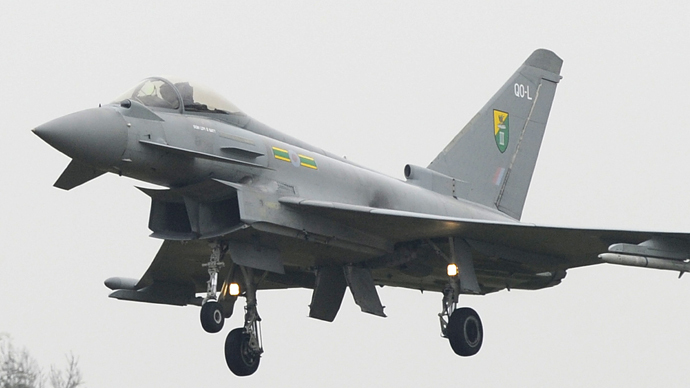‘That will show Putin!’ Britain’s RAF stages huge drills in face of ‘Russian attack threat’

More than 30 UK Royal Air Force planes took to the skies for Rising Panther, Britain’s largest aerial exercises in more than a decade.
Military sources confirmed the drills were in response to increased Russian presence around UK shores.
READ MORE: Swedish jets track 4 Russian planes over Baltic Sea
“Russia has certainly painted the background to these exercises, though of course they are needed in any event,” a high-ranking source within the NATO member’s air force told The Sunday Express. The newspaper cited another source as saying that the war games would “show Vladimir Putin in no uncertain terms” that Britain is ready for any military confrontation.
READ MORE: US National Guard sends 12 F-15 interceptor jets to Europe to guard against Russia
British press underscored the scale of the drills, with The Sunday Times says nothing like this has been seen in 13 years and The Sunday Express noting it's the largest exercises since the Cold War.
In the training missions, conducted earlier this month, Tornado strike aircraft arriving from Norway in a “mass” attack were intercepted by a team of Typhoon fighters from several locations in the North East of England and Scotland, co-ordinated through ground control.
The exercises will now be conducted up to six times a year, said the RAF.
“Due to our continuing commitment to operations overseas, this is the first time we have had the full spectrum of our capability operating together at the same time in a realistic, opposed, environment,” said Wing Commander Andy Coe through the official RAF News portal.
READ MORE: Russia warns NATO drills a ‘problem’ as US attack planes buzz Poland
A video emerged last month of Russia’s Tu-95 Bear bomber – capable of carrying a nuclear payload and disabling a Trident submarine – being shepherded by fighter jets off the coast of Cornwall.
The Russian airplane did not enter UK skies, and Russia has stoutly defended its practice of testing its operational capacity around the world. Moscow did not confirm details of that particular sortie.
UK Prime Minister David Cameron accused the Kremlin of “trying to make some sort of point.” But Foreign Secretary Philip Hammond has been less flippant about a perceived Russian threat.
“The rapid pace with which Russia is seeking to modernize her forces, combined with the increasingly aggressive stance of the Russian military, are all significant causes of concern,” he said this month. “Russia has the potential to pose the single greatest threat to our security.”
READ MORE: Hornets’ nest: Massive drills across Russia, 20 ships in Baltic Sea (PHOTO, VIDEO)
Last week, Russia completed a surprise mass mobilization and drill of its Northern Fleet. This involved more than 110 aircraft, as well as 40,000 servicemen and over 40 ships.
With tension rising between Moscow and the West, largely over events in Ukraine, the Kremlin has upped defense spending by a third this year, with a military budget of $50 billion dollars.
“Putin has spent five years getting his bomber boys and girls back up to speed – he is investing in honing their skills. We need to show him and the world we are still ready to take on a major league fixture,” Andrew Brookes, a retired RAF wing commander and current aviation expert told the Sunday Times.
Despite allegations of the Russian military’s “aggressive stance,” the allies see no double-standards in massive military build-up of NATO troops right on the Russian border.
READ MORE: Drills for me but not for thee: NATO launches war games near Russian border
Thousands of US troops and hundreds of tanks have poured into Estonia, Latvia and Lithuania in the past two months as part of an operation dubbed “Atlantic Resolve.” In February, 140 NATO vehicles and 1400 troops swept through Narva, a mere 300 meters from the Russian border.
On March 21, a convoy of Strykers, US armored fighting vehicles, started its 1,100-mile tour through Estonia, Lithuania, Poland, Latvia, the Czech Republic to Germany under the operation dubbed ‘Dragoon Ride.’ The mission is a symbolic show of force and solidarity with Eastern European allies “that live closest to the Bear,” according to the commanding general of US Army Europe, Lt. Gen. Ben Hodges. US Army’s 2nd and 3rd Cavalry Regiments are taking part in the controversial “exercise.”
READ MORE: ‘Stop US Army’: Czech activists protest military convoy (VIDEO)
Czech people were told not to throw tomatoes and eggs at the US military convoy, with the local media citing the laws of the land allowing up to three years in prison for “disorderly conduct” or “damage to property.” On Saturday, hundreds came out to protest against the US convoy passing through the Czech Republic and briefly clashed with pro-NATO demonstrators rallying nearby.
Meanwhile, twelve American F-15C fighters jets with 200 troops from the 125th Fighter Wing of the Florida Air National Guard have been ordered to go to Europe in mid-April, the US Air Forces in Europe reported. Earlier, four US A-10 Thunderbolt II attack planes were taking part in drills in western Poland.
Moscow has denounced NATO military build-up at the so-called “eastern flank,” warning that it will only increase tension in the region and have long-term negative consequences.
“Today’s problem is not Russia’s military activity, but the increased military activity of NATO. Every other day new military exercises take place within the framework of The Readiness Action Plan of the alliance. The number of NATO drills has exceeded 200. The total number of tactical flights of the NATO air forces over the Baltic and Barents Seas, as well as bordering Russia regions last year exceeded 3,000, which is the double number of 2013 drills,” Russia’s envoy to NATO, Aleksandr Grushko, pointed out in an interview to Germany's Das Erste TV on Wednesday.












